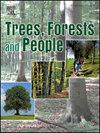A review of private forest owner typologies with potential to contribute to social milieu research in forest policy
IF 2.7
Q1 FORESTRY
引用次数: 0
Abstract
This paper explores recent research on private forest owner (PFO) typologies in forest policy, particularly those moving beyond traditional socio-demographic and structural factors, to assess their potential contribution to social milieu research in forestry. While PFO typology research is well-established and diverse, social milieu studies in forestry remain relatively novel and geographically limited, with most work conducted in Germany. Given the increasing relevance of social milieu approaches in the social sciences, this review investigates how recent PFO studies might inform the theoretical, methodological, and empirical development of milieu research.
We identified over 20 contemporary PFO studies that demonstrate strong conceptual overlaps with social milieu frameworks, particularly regarding social networks, personality traits and values, prosocial behaviour, lifestyle, social influences, place attachment, and identity. These studies often employ mixed-method designs, offering added value to social milieu research, which has primarily relied on large-scale quantitative surveys. Methodologically, such approaches enhance data triangulation and support the operationalisation of milieu concepts in both academic and applied settings.
Empirically, PFO studies contribute valuable data on both general social and forest related dimensions (e.g., attitudes, activities and networks), facilitating cross-domain integration. Furthermore, their broader geographical scope can complement the currently German-centric milieu literature.
In conclusion, PFO typology research and social milieu research are mutually beneficial. PFO studies can inform and enhance social milieu approaches in forestry, while milieu frameworks offer PFO research a richer lens through which to understand forest owner diversity in a changing societal context.
对可能有助于森林政策社会环境研究的私人森林所有者类型学的综述
本文探讨了森林政策中私人森林所有者(PFO)类型的最新研究,特别是那些超越传统社会人口和结构因素的研究,以评估它们对林业社会环境研究的潜在贡献。虽然PFO类型学研究已经建立和多样化,但林业的社会环境研究仍然相对新颖且地理上有限,大多数工作在德国进行。鉴于社会环境研究方法在社会科学中的相关性日益增强,本综述探讨了最近的PFO研究如何为环境研究的理论、方法和实证发展提供信息。我们确定了20多个当代PFO研究,这些研究表明PFO与社会环境框架有很强的概念重叠,特别是在社会网络、人格特征和价值观、亲社会行为、生活方式、社会影响、地方依恋和身份认同方面。这些研究通常采用混合方法设计,为主要依赖大规模定量调查的社会环境研究提供附加价值。在方法上,这种方法增强了数据三角测量,并支持在学术和应用环境中环境概念的操作化。从经验上看,森林资源研究提供了关于一般社会和森林相关方面(例如态度、活动和网络)的宝贵数据,促进了跨领域整合。此外,它们更广阔的地理范围可以补充当前以德国为中心的环境文学。总之,PFO类型学研究与社会环境研究是相互促进的。森林所有者的研究可以为林业的社会环境方法提供信息和加强,而环境框架为森林所有者的研究提供了一个更丰富的视角,通过该视角可以了解不断变化的社会背景下森林所有者的多样性。
本文章由计算机程序翻译,如有差异,请以英文原文为准。
求助全文
约1分钟内获得全文
求助全文
来源期刊

Trees, Forests and People
Economics, Econometrics and Finance-Economics, Econometrics and Finance (miscellaneous)
CiteScore
4.30
自引率
7.40%
发文量
172
审稿时长
56 days
 求助内容:
求助内容: 应助结果提醒方式:
应助结果提醒方式:


